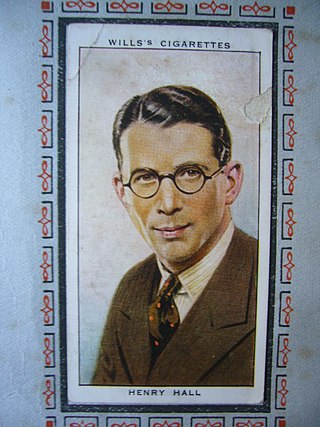Ronald Binge was a British composer and arranger of light music. He arranged many of Mantovani's most famous pieces before composing his own music, which included Elizabethan Serenade and "Sailing By".

The BBC Light Programme was a national radio station which broadcast chiefly mainstream light entertainment and light music from 1945 until 1967, when it was replaced by BBC Radio 1 and BBC Radio 2. It opened on 29 July 1945, taking over the long wave frequency which had earlier been used – prior to the outbreak of the Second World War on 1 September 1939 – by the BBC National Programme.

BBC Radio 3 is a British national radio station owned and operated by the BBC. It replaced the BBC Third Programme in 1967 and broadcasts classical music and opera, with jazz, world music, drama, culture and the arts also featuring. The station has described itself as "the world's most significant commissioner of new music".
Friday Night Is Music Night is a long-running live BBC radio concert programme featuring the BBC Concert Orchestra, broadcast from 1953 to 2023 on the BBC Light Programme and its successor BBC Radio 2, moving to BBC Radio 3 from April 2024.

The BBC Forces Programme was a national radio station which operated from 7 January 1940 until 26 February 1944.

Light music is a less-serious form of Western classical music, which originated in the 18th and 19th centuries and continues today. Its heyday was in the mid‑20th century. The style is through-composed, usually shorter orchestral pieces and suites designed to appeal to a wider context and audience than more sophisticated forms such as the concerto, the symphony and the opera.

Henry Robert Hall, CBE was an English bandleader who performed regularly on BBC Radio during the British dance band era of the 1920s and 1930s, through to the 1960s.
Charles Williams was a British composer and conductor, contributing music to over 50 films. While his career ran from 1934 through 1968, much of his work came to the big screen as stock music and was therefore uncredited.
Workers' Playtime was a British radio variety programme transmitted by the BBC between 1941 and 1964. Originally intended as a morale-booster for industrial workers in Britain during World War II, the programme was broadcast at lunchtime, three times a week, live from a factory canteen "somewhere in Britain". Initially, it was broadcast simultaneously on both the BBC Home Service and Forces Programme, then from 1957 onwards solely on the Light Programme. For all its 23 years each show concluded with the words from the show's producer, Bill Gates: "Good luck, all workers!"
The BBC Scottish Radio Orchestra (SRO) was a light music broadcasting orchestra based in Glasgow, Scotland, maintained by the British Broadcasting Corporation from 1940 until disbandment in 1981.

BBC Radio 2 is a British national radio station owned and operated by the BBC. It is the most popular station in the United Kingdom with over 14 million weekly listeners. Since launching in 1967, the station broadcasts a wide range of content. The 'About Radio 2' BBC webpage says: "With a repertoire covering more than 40 years, Radio 2 plays the widest selection of music on the radio—from classic and mainstream pop to a specialist portfolio including classical, country, folk, jazz, soul, rock 'n' roll, gospel and blues."
This is a list of events from British radio in 1964.
The Radio 2 Breakfast Show refers to a range of programming on weekday mornings on BBC Radio 2 since the station's inception on 30 September 1967. The show's longest serving host to date was Sir Terry Wogan, who worked on the programme for over 29 years in two separate stints, from 3 April 1972 until 28 December 1984, and again from 4 January 1993 until 18 December 2009. The show's shortest serving host to date was Brian Hayes, who hosted the show from 6 January to 23 December 1992. Since 14 January 2019, the show has been hosted by Zoe Ball.
A timeline of notable events relating to BBC Radio 3, a British national radio station which began broadcasting in September 1967.

John Robert Coles was a British composer, trumpeter, arranger, and conductor of light music, best known for his composition Tyrolean Tango. Coles often composed under the pen-name 'Paul Stewart' and 'Paul Vincent'.
This is a list of events from British radio in 1945.
This is a list of events from British radio in 1940.
Jack Leon was a Russian-born British dance band and orchestra leader and conductor, of easy listening and light orchestral music.
Helen Clare was a British singer who was well known in the 1930s and 1940s through her work in variety, radio, television and recording. Clare worked extensively in light entertainment, appearing on BBC Radio and recording with British dance bands. Her distinctive soprano voice saw her working with some of the biggest names of the era, including bandleaders Jack Jackson and Henry Hall. She was one of the last surviving British singers who had been active in the 1930s.

George Scott-Wood was a British pianist, accordionist, arranger and bandleader.